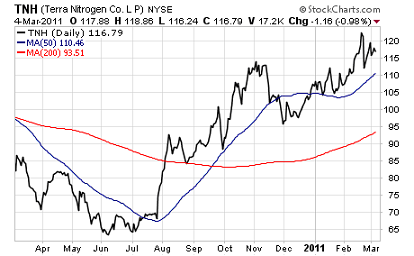The United Nations predicts that world population
will reach 9 billion people by 2050. That's an increase of 33% over the
world population right now.
It also says that global food output will have to increase by 70 percent to meet rising demand. Bloomberg reports that farmers are already ramping up crop production to satisfy demand.
The forecasted supply-demand imbalance for crops
led futures prices for corn to nearly double in the past year - adding to
the surge in prices many U.S. 'breadbasket' states suffered through a dry
growing season.
During the same time, wheat prices rose 65
percent, in part due to fires and drought in Russia and Eastern Europe,
as well as flooding in Australia. All of this is leading to inflation in
food prices, as well as some soft commodities such as cotton.
Americans aren't excited about higher food prices,
but we're far better off than most people in the undeveloped world.
Already, in some countries food riots are breaking out. In other
countries, where growth has actually helped raise living standards, many
citizens of developing countries can afford to buy more meat and dairy
products. The International Monetary Fund says because of this, farmers
will be hard-pressed to meet demand for grains to feed humans and
livestock for decades.
***A basic building block of agriculture is fertilizer. To help increase crop yields, fertilizer producers are enjoying a boom in their relatively obscure industry. Investors take note; If you want to prepare for higher food prices, you should get back to basics and buy fertilizer stocks.
The three primary components of fertilizer are nitrogen, phosphorous and potassium.
Terra Nitrogen L.P. (NYSE: TNH) is one contender, the $2 billion market cap company (a limited partnership) is a leading U.S. producer of nitrogen fertilizer products.
The stock also pays a nice quarterly distribution that yields north of 4.5 percent annualized. Additionally, earnings per share have increased significantly, from $5.40 in 2009 to $8.01 in 2010, an increase of 48 percent.
Terra Nitrogen's sole plant in Oklahoma can crank out 1.9 million tons of nitrogen fertilizer and 1.1 million tons of ammonia, a basic ingredient of fertilizer and other industrial products. It takes air, water and natural gas to produce nitrogen.
During the fourth quarter, Terra Nitrogen reported
increases of 51 percent in ammonia and 34 percent in urea ammonium
nitrate (UAN) selling prices. Ammonia sales volume increased 56 percent
while UAN sales volume decreased by 2 percent.

Investors have grown to appreciate Terra Nitrogen's cash distribution. In
2007, the partnership began to truly ramp up quarterly payments, which
reached as high as $4.45 in early 2008. In early 2010, Terra missed a
distribution, but these were resumed in May.
The latest distribution for fourth-quarter 2010
was $1.36, bringing the full-year payout to $5.44 and a substantial
annual yield of 4.7 percent. By comparison, the S&P 500's dividend
yield is around 1.7 percent.
Considering that net earnings in the final three
months of 2010 nearly tripled over the 2009 period, it's quite possible
that Terra Nitrogen will continue to increase earnings distributions. The
partnership's profit margin and operating margin are both above 35
percent..
***To prepare for higher food prices, a dividend
paying fertilizer like Terra Nitrogen should be on the top of your
list.
Since dividend-paying stocks are a necessary part of every portfolio. I'd like to offer you a copy of my free special report on dividend-paying stocks, by clicking here. You'll also have an opportunity to sign up for a risk-free trial to Small Cap Investor PRO portfolio, which includes stocks that have produced returns of 240 percent and 170 percent. This dividend report features two stocks yielding over 7 percent right now.
© 2024 Benzinga.com. Benzinga does not provide investment advice. All rights reserved.
Comments
Trade confidently with insights and alerts from analyst ratings, free reports and breaking news that affects the stocks you care about.